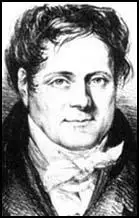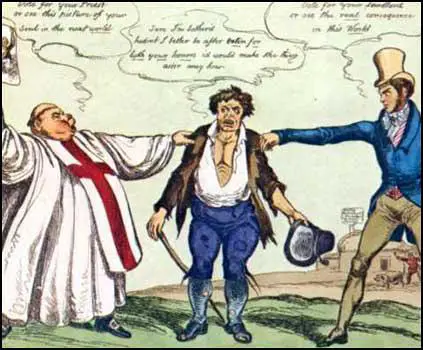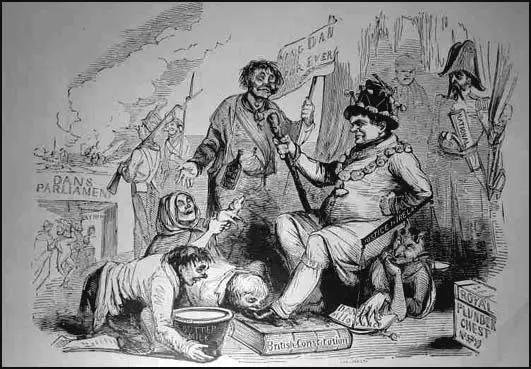Daniel O'Connell

Daniel O'Connell was born near Cahersiveen, County Kerry, on 6th August 1775. The O'Connell family were members of the Irish Catholic aristocracy in Ireland. Although Daniel's family were fairly wealthy, discriminatory legislation denied the O'Connell family status, opportunity and influence. (1)
In 1794 O'Connell enrolled in Lincoln's Inn, London and two years later transferred to the King's Inn, Dublin. While in London O'Connell became interested in politics. He read a great deal and was influenced by the ideas of radicals such as Tom Paine, Jeremy Bentham and William Godwin. By the time he qualified as a lawyer in 1798 O'Connell was fully committed to religious tolerance, freedom of conscience, democracy and the separation of Church and State. (2)
In Ireland O'Connell developed a reputation for his radical political views. He became involved with the United Irishmen, a group that had been inspired by the French Revolution. During the 1798 insurrection, O'Connell feared he would be arrested by the English authorities and went into hiding in Kerry. Despite his radical views, O'Connell opposed the insurrection. He argued that the Irish people "were not sufficiently enlightened to hear the sun of freedom" and that the insurrection had decreased rather than increased the desire for Irish liberation. Instead of rebellion, O'Connell advocated using the machinery of Parliament to obtain political and religious equality. (2)
Daniel O'Connell and the Catholic Association
In 1823 Daniel O'Connell, Richard Lalor Sheil and Thomas Wyse formed the Catholic Association. As Vincent Comerford has pointed out: "At O'Connell's insistence the new body had a stated objective much wider than the simple ‘relief’ or emancipation which would allow a small minority of Catholics like himself to proceed to inner bar, bench, or parliament: it was to address all the concerns of the Roman Catholic collectivity. This signalled the start of a mobilization of the populace for constitutional political ends which had little precedent anywhere, was contrary to the instincts of contemporary Liberals, and was to make O'Connell a historical figure of European significance." (3)
In its first manifesto the Catholic Association argued: "The catholics of Ireland have long been engaged in a painful and anxious struggle to attain, by peaceful and constitutional means, those civil rights, to which every subject of these realms is entitled, and of which our forefathers were basely... deprived ... At no former period of this protracted struggle had the catholic people of Ireland so little reason to entertain hope of immediate success... but they do not dare to despair. They know that their cause is just and holy. It is the cause of religion and liberty. It is the cause of their country and their God." (4)

O'Connell turned the Catholic Association into a mass organisation by inviting the poor to become associate members for a shilling a year. Catholic priests were encouraged to advertise the Catholic Association and were employed as recruiting agents. "The Association had a ready network of agents in every parish to stir opinion and to collect the penny a month Catholic Rent to finance the agitation." (5)
Catholic Emancipation
The Catholic Association campaigned for the repeal of the Act of Union, the end of the Irish tithe system, universal suffrage and a secret ballot for parliamentary elections. Although O'Connell rejected the use of violence he constantly warned the British government that if reform did not take place, the Irish masses would start listening to the "counsels of violent men". (6)
By 1826 the Catholic Association began supporting candidates in parliamentary elections. They had some spectacular victories, including Daniel O'Connell defeating C. E. Vesty Fitzgerald, President of the Board of Trade, in a County Clare by-election. However, as a Catholic, O'Connell could not take the Oath of Supremacy, which was incompatible with Catholicism and so could not take his seat in the House of Commons. (7)
Radical MPs such as Sir Francis Burdett and Joseph Hume, had been arguing for some years that Parliament should bring an end to anti-Catholic legislation. After O'Connell's victory, even Tories such as Sir Robert Peel and Arthur Wellesley, Duke of Wellington, began arguing for reform. They warned their Conservative colleagues that here would be civil war in Ireland unless the law was changed. The Roman Catholic Relief Bill was published in March 1829. O'Connell wrote to his wife: "Peel's bill for Emancipation, is good - very good, frank, direct, complete; no veto, no control". (8)
In 1829 the British Parliament passed the Roman Catholic Relief Act, which granted Catholic Emancipation. O'Connell was less pleased with the Irish Parliamentary Election Bill, that raised the threshold for the county franchise from 40s. to £10, thereby disenfranchising the bulk of his electoral support. As a result of this legislation the Irish electorate was reduced from 200,000 to 26,000. (9)
Daniel O'Connell celebrating Catholic Emancipation (1829)
The government also outlawed the Catholic Association. However, on 30th May, 1829, O'Connell was returned unopposed for County Clare and he took his seat on 4th February 1830. Over the next few years O'Connell became a major figure in the House of Commons. He was active in the campaigns for prison and law reform, free trade, the abolition of slavery and Jewish emancipation. He was also a prominent figure in the campaign for universal suffrage. After the disappointment of the 1832 Reform Act, British Radicals adopted the tactics that had been used by O'Connell successfully in Ireland. Organizations such as the Chartists used O'Connell's methods of organizing and applying the pressure of public opinion while implying that if this was not successful, the movement might resort to violence. (10)
O'Connell had a major influence on MPs. Of the105 Irish MPs, 45 loyally supported O'Connell, including Feargus O'Connor, who was later to become one of the main leaders of the Chartist movement. O'Connell's control over this group enabled him to exert considerable pressure on the government. In 1835 O'Connell and fellow Catholic MPs agreed to support Lord Melbourne and his Whig government in return for significant Irish reforms. Although the Whig government passed the Tithe Commutation Bill and the Irish Municipal Reform Act, O'Connell thought this was inadequate. He was also totally opposed to the passing of the Irish Poor Law and when the Whigs refused to change it, O'Connell withdrew his group's support for the government. (11)
In 1841 O'Connell became the first Catholic Lord Mayor of Dublin. After completing his year in office, O'Connell announced he now intended to concentrate of achieving the repeal of the Act of Union. On the 1st January 1843, O'Connell pledged that he would achieve repeal before the end of the year. Once again O'Connell suggested that if Parliament did not take action it faced the possibility of civil war. However, very few MPs in the House of Commons supported the repeal of the Union, and therefore O'Connell was not in a strong negotiating position. (12)
The Corn Laws and the Rise of Irish Nationalism
Sir Robert Peel attempted to overcome the religious conflict in Ireland by setting up the Devon Commission to inquire into the "state of the law and practice in respect to the occupation of land in Ireland." However, Peel's attempts to improve the situation in Ireland was severely damaged by the 1845 potato blight. The Irish crop failed, therefore depriving the people of their staple food. Peel was informed that three million poor people in Ireland who had previously lived on potatoes would require cheap imported corn. Peel realised that they only way to avert starvation was to remove the duties on imported corn. (13)

The first months of 1846 were dominated by a battle in Parliament between the free traders and the protectionists over the repeal of the Corn Laws. William Gladstone gave Peel his loyal support. Benjamin Disraeli became the leader of the group that opposed Peel. He was accused of using this difficult situation to undermine the Prime Minister. However, he later told a fellow MP that he did this "because, from my earliest years, my sympathies had been with the landed interest of England". (14) Disraeli made a stinging attack on Peel when he accusing him of betraying "the independence of party" and thus "the integrity of public men, and the power and influence of Parliament itself". (15)
An alliance of free-trade Conservatives (Peelites), Radicals, and Whigs assured the repeal of the Corn Laws. However, it caused a split in the Conservative Party. "It was not a straight division of landed gentry against the rest. It was a division between those who considered that the retention of the corn laws was an essential bulwark of the order of society in which they believed and those who considered that the Irish famine and the Anti-Corn Law League had made retention even more dangerous to that order than abandonment." (16)
O'Connell was now a sick man and in March 1847 he decided on a pilgrimage to Rome. When he reached Paris he was greeted by a large crowd of radicals who wished to pay tribute to the man they described as the "most successful champion of liberty and democracy in Europe".
Daniel O'Connell never completed his journey and died while in Genoa on 15th May, 1847. As requested, O'Connell's heart was buried in Rome and his body in Dublin.
Primary Sources
(1) The Committee of the Catholic Association (1824)
The catholics of Ireland have long been engaged in a painful and anxious struggle to attain, by peaceful and constitutional means, those civil rights, to which every subject of these realms is entitled, and of which our forefathers were basely... deprived ... At no former period of this protracted struggle had the catholic people of Ireland so little reason to entertain hope of immediate success... but they do not dare to despair. They know that their cause is just and holy. It is the cause of religion and liberty. It is the cause of their country and their God... But, in order effectively to exert the energies of the Irish people, pecuniary resources are absolutely necessary... Your committee propose: that a monthly subscription should be raised throughout Ireland, to be denominated "The monthly catholic rent" ... care to be taken to publish in or near each catholic chapel as may be permitted by the clergy, the particulars of the sums subscribed ... and that the amount expected from each individual shall not exceed one penny per month.
Student Activities
Child Labour Simulation (Teacher Notes)
The Chartists (Answer Commentary)
Women and the Chartist Movement (Answer Commentary)
Road Transport and the Industrial Revolution (Answer Commentary)
Richard Arkwright and the Factory System (Answer Commentary)
Robert Owen and New Lanark (Answer Commentary)
James Watt and Steam Power (Answer Commentary)
The Domestic System (Answer Commentary)
